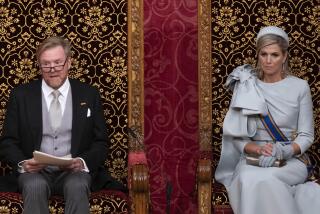Botha Rejects Black Vote, Dashes Hopes of Reforms : Won’t Free Activist Mandela
- Share via
DURBAN, South Africa — President Pieter W. Botha, dashing hopes of fundamental changes in apartheid, today rejected voting rights for the nation’s black majority and warned that he will consider sterner measures to end racial unrest.
Botha also did not announce specific reforms in the apartheid system in a much-awaited speech to a conference of the all-white National Party.
He reassured his audience that he is “not prepared to lead white South Africans and other minorities on a road to abdication and suicide. Destroy white South Africa, and our influence and this country will drift into faction, strife, chaos and poverty.”
Botha also reaffirmed that he will not consider releasing African National Congress leader Nelson Mandela from prison unless he renounces the use of violence. Mandela, who has become a living symbol of black frustration and of black hope, was jailed more than 20 years ago.
As he began talking, the white-minority government clamped a 10 p.m.-4 a.m. curfew on the nation’s biggest black township of Soweto outside Johannesburg, where an estimated 2 million blacks live, and in Alexandra, north of the city.
In the speech, Botha gave no details of any reform plans, quenching feverish speculation at home and abroad.
He said he and other “reasonable” South Africans will not accept the principle of one-man, one-vote in a unified state that “would lead to domination of one group over another.”
He also ruled out establishing a black fourth chamber in parliament. Indians and mixed-race people were admitted to their own segregated chambers under constitutional reforms last year.
Botha, who clamped a state of emergency on many of the tensest zones in late July, said he had been “lenient” in the face of widespread unrest and racial violence but added: “Don’t push us too hard. Don’t push us too hard.”
He condemned what he called barbaric communist agitators for fomenting rioting in black townships that has killed more than 600 people in the last 19 months.
“My government and I are determined to press ahead with our reform program, and to those who prefer revolution to reform, I say they will not succeed no matter how much support and encouragement they derive from outside sources,” he said.
Government sources in Pretoria said Botha would not want to be seen domestically to be making concessions under foreign pressure.
“I believe in participation of all the South African communities on matters of common concern,” Botha said. “I believe there should exist structures to reach this goal of co-responsibility and participation.”
Botha’s speech was certain to disappoint South Africa’s Western allies, who are under increasing pressure to apply sanctions against the country and who were hoping for liberal, fundamental reforms to apartheid, the system of strict racial segregation that permeates South African life.
The president, being urged to reform by his black opponents and to stand firm by many right-wing whites amid the nationwide rioting, suggested that widespread speculation of new apartheid reforms was an attempt to compromise him and the government.
“Many of the present overseas perceptions of the South African situation are, of course, quite erroneous,” he said.
He confirmed that the government is considering softening the influx control laws that restrict the movement of blacks in South Africa but did not go beyond previous promises.
“On the question of influx control, I can only say that the present system is outdated and too costly,” he said, repeating that the legitimate rights of urban blacks outside the tribal homelands set up by Pretoria would have to be discussed.
More to Read
Sign up for Essential California
The most important California stories and recommendations in your inbox every morning.
You may occasionally receive promotional content from the Los Angeles Times.













